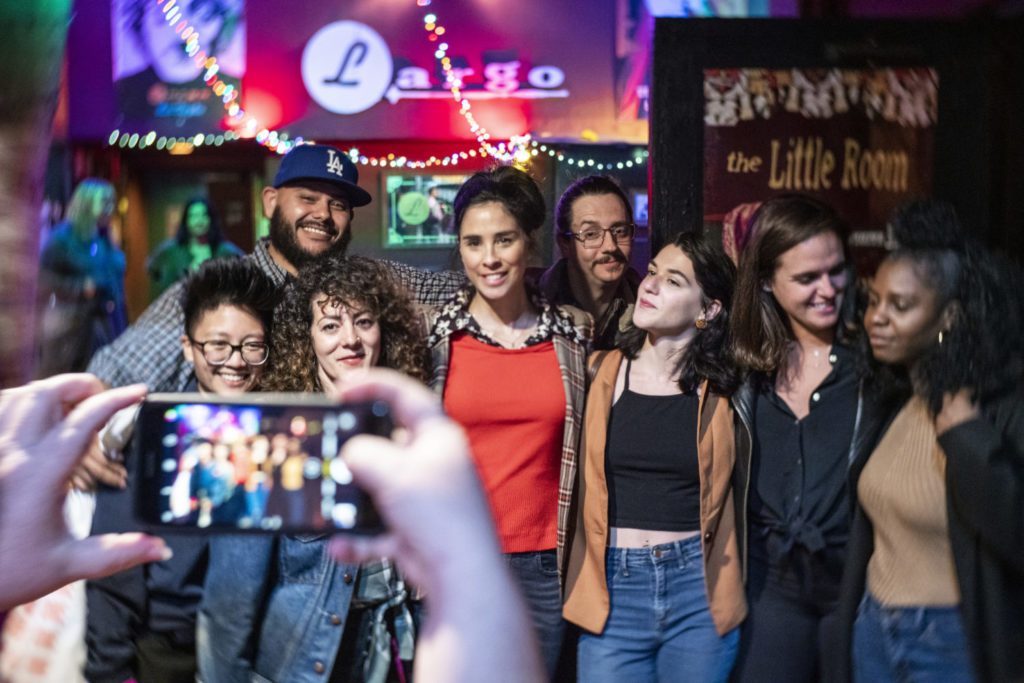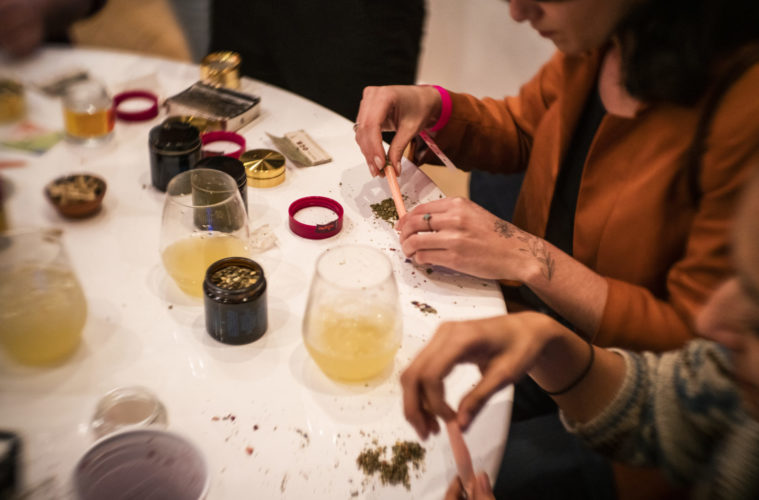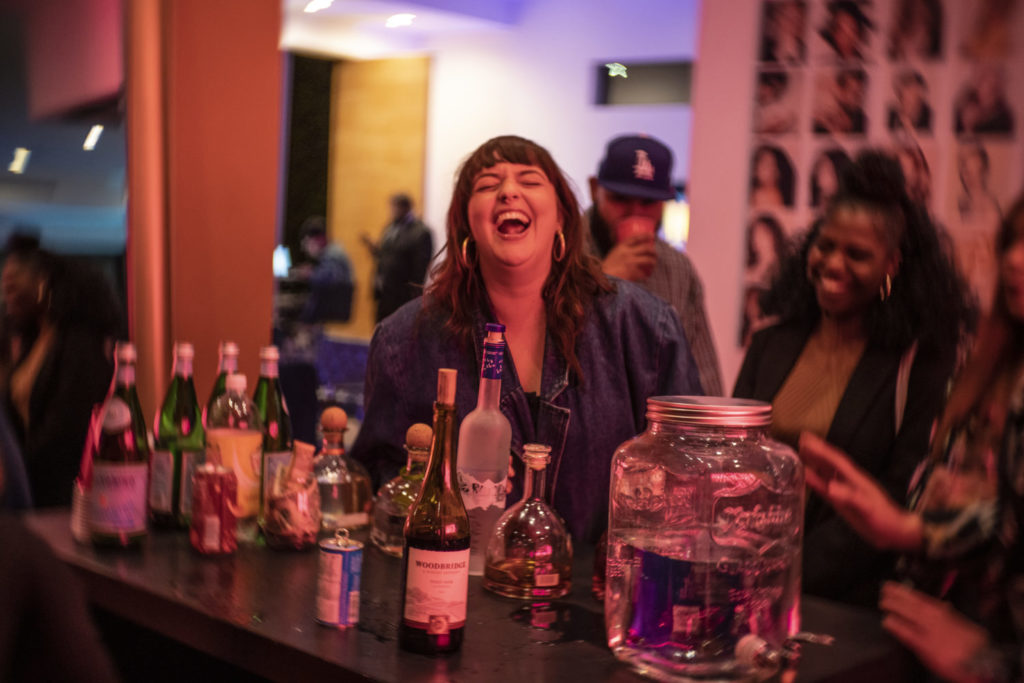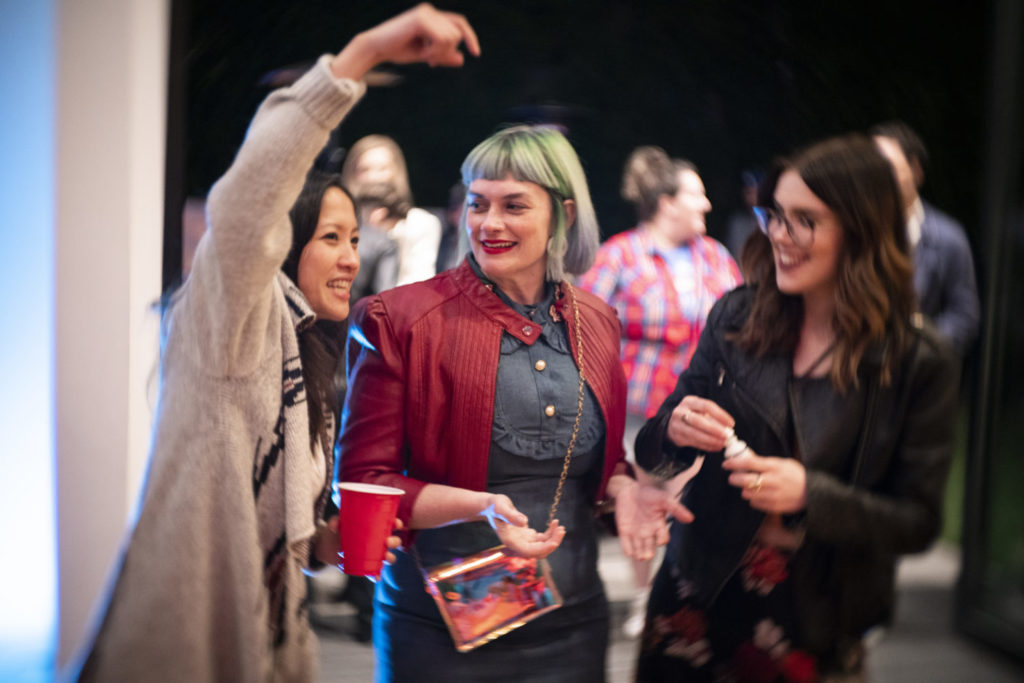Sarah Silverman and friends sparked up some laughs in support of gender equity in the cannabis industry this month at Largo at the Coronet.
The fundraiser also served as a celebration of Silverman joining the advisory board of the night’s beneficiary, The Initiative, a Portland-based business accelerator with the goal of increasing the number of successful female founders in the cannabis industry.

Silverman performs to a sold out theater. (Sam Gehrke)
All of the evening’s proceeds are destined for programming developed by The Initiative and Sarah to ensure the people and communities hit the hardest by the War on Drugs have access to training and resources needed to participate in the rapidly growing industry. A portion of the funds raised will go to allied organizations working on criminal justice issues, sponsor expungement events and create a scholarship program to allow people who otherwise may be unable to join The Initiative to participate.
Silverman was joined by special guest comedians, including Beth Setlling, Doug Benson and Reggie Watts.
“Things went great the other night, to have Sarah on the board and participating in helping to bring attention to the ongoing gender issues we have in the cannabis industry,” The Initiative’s founder Amy Margolis told L.A. Weekly as the enthusiasm took over.
Silverman and friends were able to raise about $25,000 for the cause by packing the theater.
Helping Female Cannabis Entrepreneurs Succeed
The Initiative has already graduated two classes of women-backed cannabis business. They’re currently in the midst of planning a variety of events around the country for female entrepreneurs. These include a week-long bootcamp in Chicago for those attempting to enter the recently launched Illinois pot market, while another stop is planned for Palm Springs near the end of summer.

(Sam Gehrke)
Palm Springs will be The Initiative’s third retreat — across the various styles of programming offered they’ve served over 1,000 people. The Initiative’s next full three-month business accelerator program with more extensive classroom time will open the application process in the next 60 days.
The companies that have completed The Initiative’s full curriculum have raised nearly $3 million. The second class only graduated 30 days ago, so expect that number to jump as they begin to raise capital more aggressively. Some of the graduates will be going for a more organic expansion and don’t plan on raising any funds.
We asked Margolis if she thought lowering the bar to the industry as a whole was critical to it not turning into another sector full of predominantly white male boardrooms?
“My feeling is the competitive licensing space encouraged exclusivity. You need a ton of resources to apply, you need a lot of money,” Margolis replied, “You see these big operators stepping in and essentially using minorities as their founders in order to get licensing and then screwing them.”
- (Sam Gehrke)
- (Sam Gehrke)
- (Sam Gehrke)
- (Sam Gehrke)
Margolis believes that system, the system of competitive and exclusive licensing, is the biggest barrier to entry. She believes the way you allow an industry to be diverse is it’s open for everyone to get a license.
“I don’t think these states with competitive licensing programs, even with equity programs, are doing any impacted communities, communities of color, any favors,” Margolis said, “If everyone can apply, you aren’t giving an advantage to large companies that are white males who are going to come in and essentially dominate because they have the resources to do that.”
The Social Construction of Gender Equity in Cannabis
Another woman who has spent years working on helping get her peers through the cannabis industry’s door is Dr. Amanda Reiman of Flowkana. Prior to heading north to help farmers organize in the wake of Proposition 64, Reiman served as the Drug Policy Alliance’s point person on the campaign. She was one of the founding board members of The Initiative and is thrilled to have Silverman joining the team. When Reiman leads the classroom sessions, she focuses on how gender has been socially constructed and its impacts on emerging female entrepreneurs.
We asked Reiman how rewarding it was to take part in actual people building in cannabis, as opposed to previous women-centric cannabis events that had been focused around networking.
“I think there is a difference between giving women a platform to get together to support each other, which I think is absolutely essential in this industry for many reasons, but then there is also how do you translate that into actual business training and access to capital,” Reiman told L.A. Weekly. “That moves beyond just supporting each other and actually created a business development opportunity.”
When forming The Initiatives mission those that took part thought long and hard about the specific challenges women trying to enter the industry would face. Reiman admits though a lot of the challenges are impacting the industry as a whole at the moment.
“I think where women get more impacted is where the funding streams are scarce and it is more of a ‘do they trust you to be a successful business person in this volatile climate’ kind of scenario,” Reiman said, “Pointing back to how gender has been socially constructed, this idea that in times of crisis men are the strong ones that can survive.”
Reiman said that the idea has made it exceptionally hard for women to survive in this environment to get capital. Part of the plan in supporting the founders going through The Initiative right now is that they are creating a constellation of support for each other, as women-owned brands are more likely to support fellow women-owned brands when given the opportunity.
Better Than Most
Nevertheless, gender equity in the workplace is a wider issue in society. We asked Reiman if she believed the industry was generally ahead of the curve?
“I think we’re absolutely still ahead of the curve,” Reiman replied, “Compared to other industries we still have more women in leadership positions, but we’re losing that ground.”
Reiman believes where the industry use to be further ahead of other sectors on the subject of gender equity, but now cannabis is starting to look more familiar to other industries in recent years.
“There is this word people like to use, professionalization. I think that’s kind of code for white males. So as we see the ‘professionalization’ of the industry, we see it resemble other industries more closely,” Reiman said.
Advertising disclosure: We may receive compensation for some of the links in our stories. Thank you for supporting LA Weekly and our advertisers.





